"You are here. You have already arrived."
poet, writer, editor & teacher James Crews on the power of "wonder walks," allowing things to be as they are, and seeing writing and mindfulness as "two strands of a single braid"🪶 ✨
This is a Beginner’s Mind interview, a series that explores the intersection of mindfulness and creative practice. Zen master Shunryū Suzuki Roshi said, “In the beginner’s mind, there are many possibilities; in the expert’s mind, there are few.” This series shines a light on the practices that sustain people in their daily lives and open the path to new possibilities. If you know (or are) a writer, creative person, teacher, or practitioner with practices you’d like to share, just reply to this newsletter to be in touch with me. Subscribe below to make sure you don’t miss any future interviews.✨✨
James Crews is a poet, writer, and editor whose work I’ve admired for many years. A few years back, one of my high school students came across James’ anthology, The Path to Kindness: Poems of Connection and Joy, on the bookshelf in my classroom and it opened poetry to her in a new way. One day (perhaps while doomscrolling), I saw that James had posted something about this very book, and I commented to say how much of an impact the book had made on my student. James replied and offered to send her a signed copy (who does that?!) It was truly life-changing for her to receive that kind of deep generosity.
Reading James’ writing, I’m struck by how it is rooted in a bedrock of mindful awareness. You can tell that he practices being where he is, and feel that presence vibrating in his writing. James’ writing makes the vivid details of our still-beautiful world come alive, like “the scent of a tangerine / that lingers on the fingers long after / you’ve finished peeling it.”
Read on for James’ wisdom on the power of "wonder walks," allowing things to be as they are, and seeing writing and mindfulness as "two strands of a single braid. James also shares a rich prompt for writing that might be just what you need right now—to “Say Yes.” 🪶 ✨
What is your writing practice like? Do you have any writing rituals that help you?
I wake up every morning as early as possible, often around 3:30 or 4am. I never reach for my phone or open my computer first thing. I find it necessary for my creative and mindfulness practice to offer myself a few hours when I can feel completely alone in the house, and pretend that the rest of the world is still asleep. This allows me to be more vulnerable and take more risks than I normally would in my writing.
I make a big cup of coffee, my only one of the day, and do a free-write of several pages in my notebook—what Julia Cameron calls “Morning Pages” in her famous book on creativity, The Artist’s Way. This may sound silly, but I find it important not to use a fancy pen or journal for my work, and never to begin by typing. Somehow the plain, analog format of a simple spiral-bound notebook and pen are helpful in not placing any extra pressure on my creative spirit.
I write near a little altar I’ve created with shells, rocks, and feathers I’ve picked up on walks, as well as paintings and drawings that loved ones have shared with me. Lately, I’ve begun keeping a photo of my late mother on my desk and a photo of myself at five years old, wearing big, clunky black glasses with a look of bewilderment and anxiety on my small face. I can’t say exactly what this does for me, but it reminds me to bring that same childlike spirit of wonder and awe to whatever I write. Perhaps the photo also reminds me that that scared little kindergartner still lives somewhere inside me.
What are your mindfulness practices?
My own practice of mindfulness relies upon Jon Kabat-Zinn’s definition of it. He says, “Mindfulness is awareness that arises through paying attention, on purpose, in the present moment, non-judgmentally.” For me, the “non-judgmental attention” piece is the most essential aspect of mindfulness. I’m a naturally anxious person, often filled with fear and doubt, so the process of learning that my thoughts are not facts, paired with the practice of not judging myself for them, has helped immensely in my spiritual and creative process.
I think of writing and meditating as part of my mindfulness practice, but lately, what has inspired me the most is going out for what I call “wonder walks” on the wooded trails and dirt roads near my house—and even when I happen to be visiting cities. I let my non-judgmental attention lead me wherever I happen to be drawn, and I’ll often bring my smart phone with me, though turned to airplane mode so I can’t be distracted by incoming calls or messages. I’ll take photos, or write in the Notes app on my phone whatever lines arise in my mind. For me, this is good practice for the act of writing, when I want to just listen and take down onto the page whatever decides to show up, without editorializing or holding back. Wonder can’t really arise in a judgmental space, so I’m finding that the more self-compassion and welcome I can show to myself, the easier and more joyful the writing feels.
What is an important mantra or motto for you related to your writing/creative/mindfulness practices?
My most important mantra for writing and spiritual life right now is: Allow.
Just allow things to be how they are, without wishing for escape. When I first started out as a writer, I’d have an idea of where I thought a poem, essay or short story would end up, and when that piece of writing took an inevitable turn, I’d feel like a failure, disappointed that I could not live up to that perfect idea in my head. I thought the point of writing was to reach that known destination.
Now, I understand there might be a finish line calling to me from the distance, but it is likely to change by the time I sit down and write something, letting the words pull me forward. So each new word, and each new line I write, becomes an act of allowing. I now welcome that moment of surprise when a poem has taken me to a brand-new place because that means it’s likely to surprise the reader as well.
Right now, on the door to my studio is a blue post-it note with these words: “You are here. You have already arrived.” In the past few years, I’ve noticed this really unhealthy energy inside of me, this feeling that I always need to do more and more, pushing harder and harder, to ensure my work made its way into the world. Finally, about a year ago, it dawned on me, during a period of burnout, that I already had enough. I was happy with what I had accomplished thus far in my life and career, and while I do hope to touch more lives and reach more people—connection being the main goal now rather than accomplishment—I know it’s not about numbers at all. I think I would still wake up every day and write even if I had no audience whatsoever, and no chance to publish. I have come to love the act of writing that much, and I credit mindfulness with leading me to that sense of appreciation for where I am right now, which is its own kind of allowing.
Do you see your writing and mindfulness practices as connected? In what ways?
I see my writing and mindfulness practices as two strands of a single braid. This wasn’t always the way I approached them, but over the years, I noticed that the more attention I gave to meditation and my spiritual life, the deeper I went as a writer. Meditation is an achingly slow process of changing the heart and mind, and it seems to have shifted my writing toward a more simple, intimate approach. The training in meditation, which I’ve studied at Insight Meditation Society in Barre, Massachusetts for many years now, has also allowed me to bring the idea of non-judgmental attention to my writing practice. As I mentioned before, I am much more open to surprise as a result of this, and much more willing to let words emerge without attachment, without this belief we sometimes carry with us as writers that “I” did this, or “I” achieved that. It’s almost as if the words themselves are now working through me, and want to become their own thing. This is, of course, the path that has worked best for me. Others can find it through yoga, chanting, or other spiritual practices, so I always encourage folks who are beginning or restarting a mindfulness/spiritual practice to try a lot of different things, to stitch together a series of rituals that work for who they are.
My practice is always changing, and now includes writing, meditation, prayer, and wonder walks—or really, any moment I choose to stop and breathe throughout the day. I’m a little obsessed with the word “pause”—I run a writing community on Zoom called The Monthly Pause, and have included “Reflective Pauses” in my poetry anthologies for years—in part because whatever makes us pause, even briefly, is much more likely to bring us back to an embodied, aware sense of the physical world around us, and ourselves in it. For me, this is the gateway to presence—what allows us to create from a deeper place.
Are there any writers or teachers that have been transformative for you that you would recommend to readers?
A lot of teachers have helped me along the way. I would highly recommend The Artist’s Way by Julia Cameron, and her practices of Morning Pages and Artist Dates, where you take yourself alone to a new place each week meant to stimulate your creativity.
But perhaps the most helpful mentor in my spiritual and writing life has been the poet and philosopher Mark Nepo. You really can’t go wrong with any of his books, but my favorite is The Book of Awakening, a kind of daybook of short essays with quotes, with suggested meditations and reflection questions. The essays themselves are pure gold, and I have gone through this book probably five times or more in the past ten years. He inspired me to write my own book of short essays, Kindness Will Save the World, and because he started out as a poet, he often uses metaphor and story to make his point in an accessible and heart-centered way. I’ve given this book to many folks who are struggling, and the essays, when I read them now, still manage to spark new pieces of writing. Mark wrote this book after surviving cancer, so the writing has a depth and truth you don’t often find in spiritual books.
A Prompt from James 🪶 ✨
Whenever I lead a new workshop, I often begin by sharing a poem of mine called “Say Yes.” The structure of the poem is very simple, repeating the phrase, “say yes,” over and over. I wrote the poem during a period of deep grief over the loss of my mother when it was a big ask just to get out of bed and wander outside in the yard. When I share the prompt, I ask folks to start with the phrase, “Say yes,” and see what specifics come to them. Can you say yes to pleasure as well as pain? Can you say yes to things that please you as well as annoy? I often use this prompt myself, too, when I’m feeling particularly stuck, sitting out on the porch or by a window, and asking myself what I can say yes to in that moment. The goal is to open my senses to the whole world around me and within me. This particular form of poem is called anaphora, and it’s one of my favorites because it often unlocks something inside me, allowing my attention to spread out and hone in on things I might not be consciously aware of. Somehow, knowing that I have that repeating phrase to fall back on—“say yes”—can raise the stakes and allow for more risk.
Here is the poem and exercise below:
Say Yes
Say yes to suede sandals
you slip on to step outside—
yes to sun on your arms, even
the pink welt of a mosquito bite
rising up to greet you. Say yes
to this clump of wild geraniums
growing in perpetual shade
behind the house, through a rip
in the forgotten blue tarp.
Say yes to tiny pink flowers
winking in the dark you move
deeper into, so that you may
receive their promise: yes,
they say, you too can find ways
to thrive even in those places
where light seems scarce.
Invitation for Writing and Reflection 🪶 ✨
What are some of the aspects of your own experience right now, pleasant and unpleasant, that you might say yes to?
Begin with the simple phrase, “Say yes to,” and repeat it as many times as needed, allowing your heart and mind to fill in what you might choose to welcome, even when your own light seems scarce.
—From Turning Toward Grief, Broadleaf Books (Forthcoming Fall 2025).
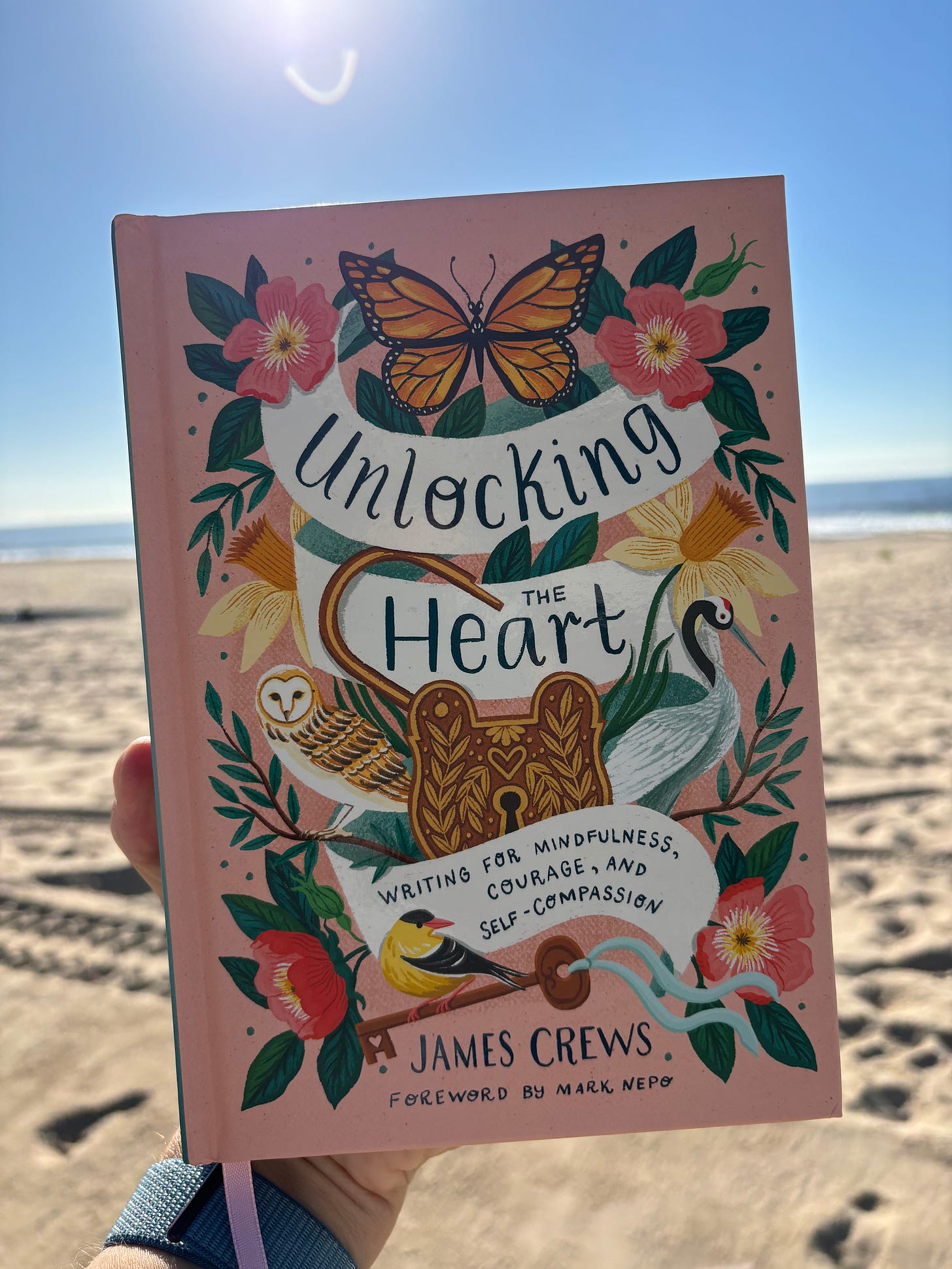
James Crews is the editor of several bestselling anthologies, including The Path to Kindness: Poems of Connection and Joy and How to Love the World: Poems of Gratitude and Hope, which has over 100,000 copies in print. He has been featured in The Washington Post, The Boston Globe, The New York Times Magazine, The New Republic, The Christian Science Monitor, and on NPR’s Morning Edition. James is the author of four prize-winning books of poetry—The Book of What Stays, Telling My Father, Bluebird, and Every Waking Moment—and a book of short essays, Kindness Will Save the World: Stories of Compassion and Connection. James also speaks and leads workshops on kindness, mindfulness, and writing for self-compassion. He lives with his husband on forty rocky acres in the woods of Southern Vermont.
For more from James
Follow him on Instagram @james.crews.poet and find out more about his work at his website.
Watch James read his poem, “Little Altars Everwhere” (one of my favorites): “There are little altars everywhere / in the world, places where you can / lay down your suffering for a while.”
Listen to James talk with Rosemerry Wahtola Trommer and Christie Aschwanden on the Emerging Form Podcast HERE.
Find out more about his online writing community, The Monthly Pause, HERE.
I also highly recommend his newsletter, Poetry Is Life, linked below 👇🏼
Clicking the heart to like this post, adding a comment, or sending it to a friend is a great, free way to help James’ work and wisdom find readers. 🪶 ✨
Be Where You Are is a newsletter about how to use writing and mindfulness to live more fully where you are. If you value this work, please text it to a friend, or consider a paid subscription (a few dollars a month) to help me keep it going.💥 You can also find me on Instagram or Facebook or find more info at my website. Thank you for reading! 🩵




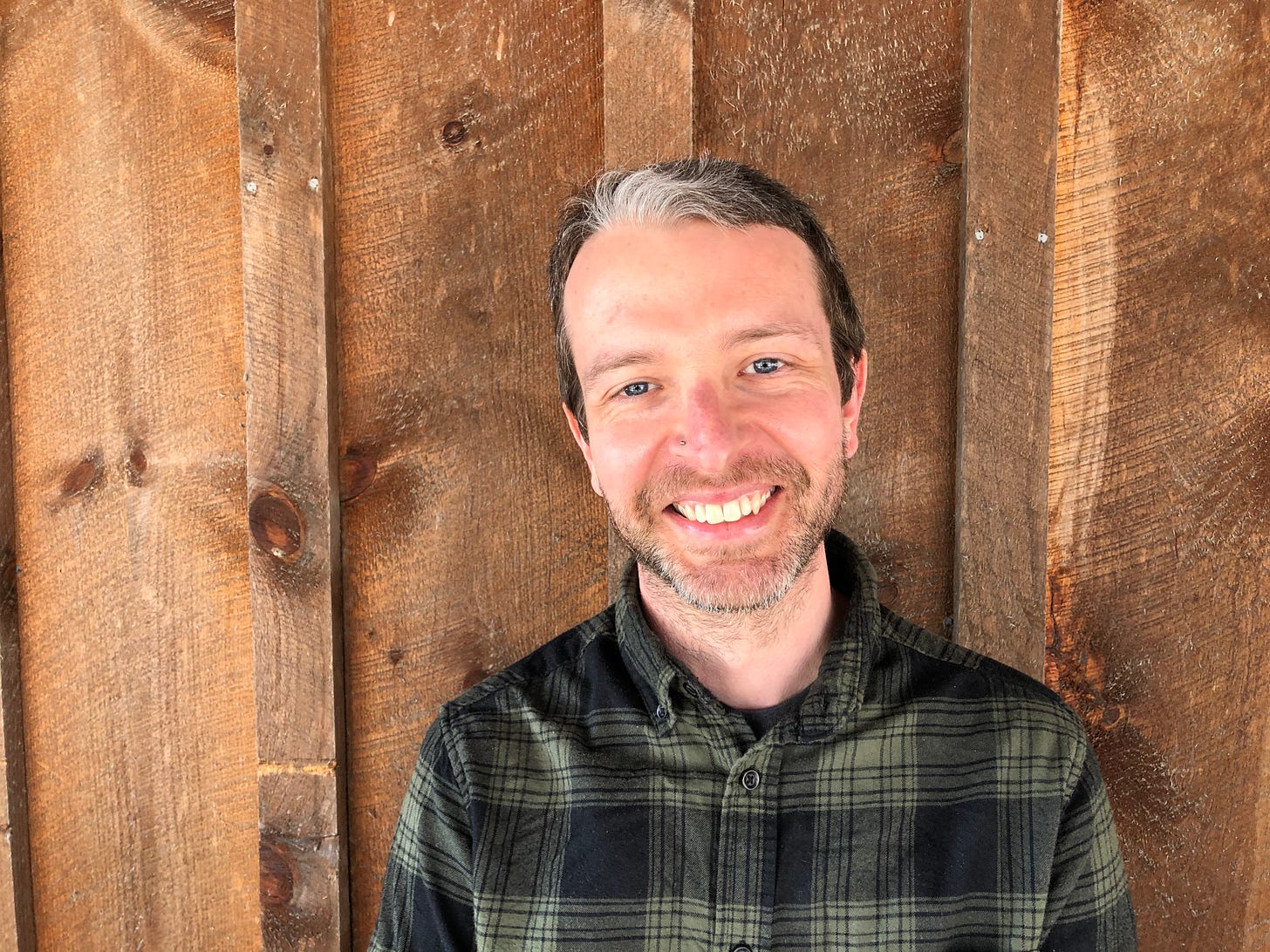
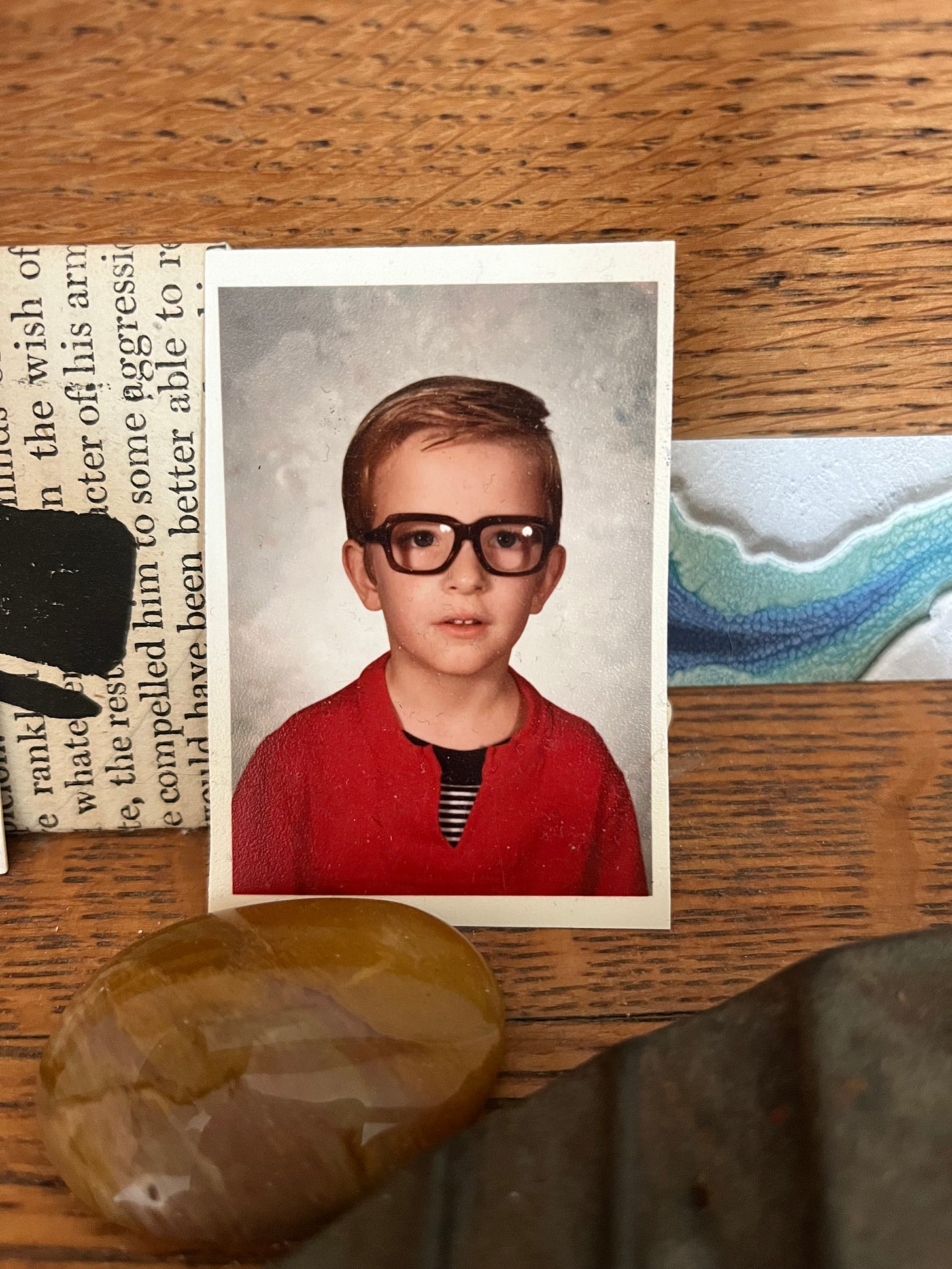
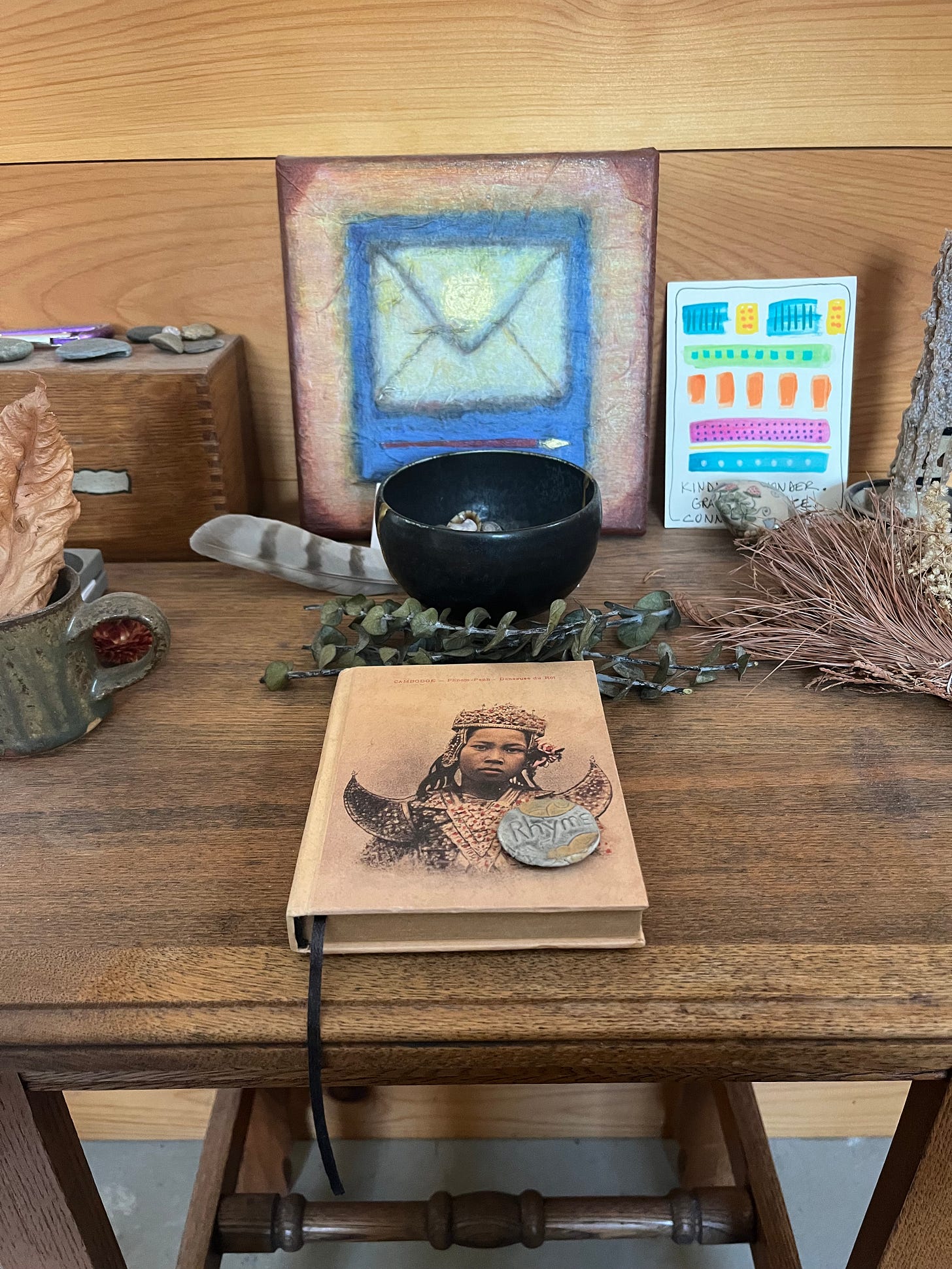
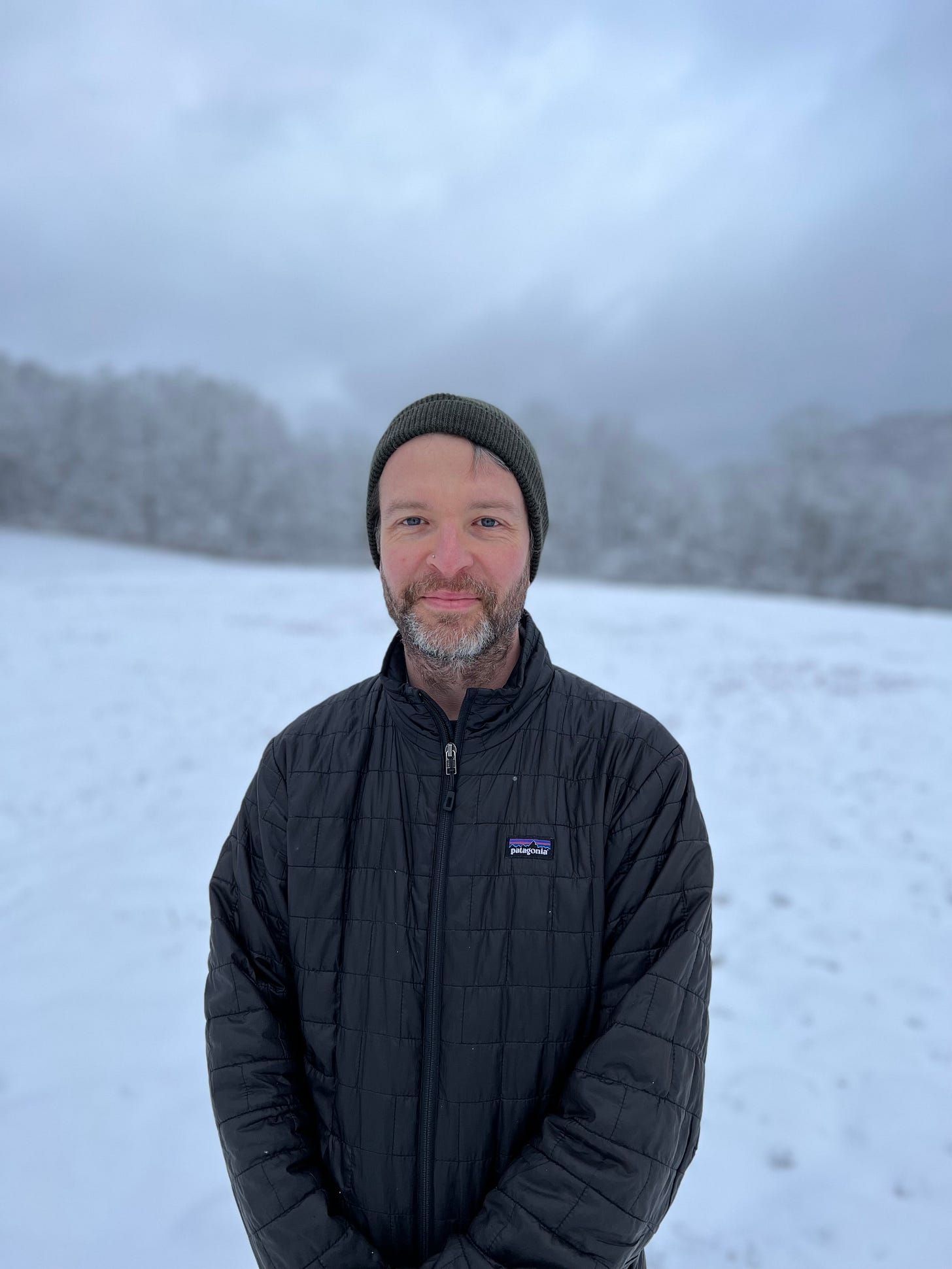
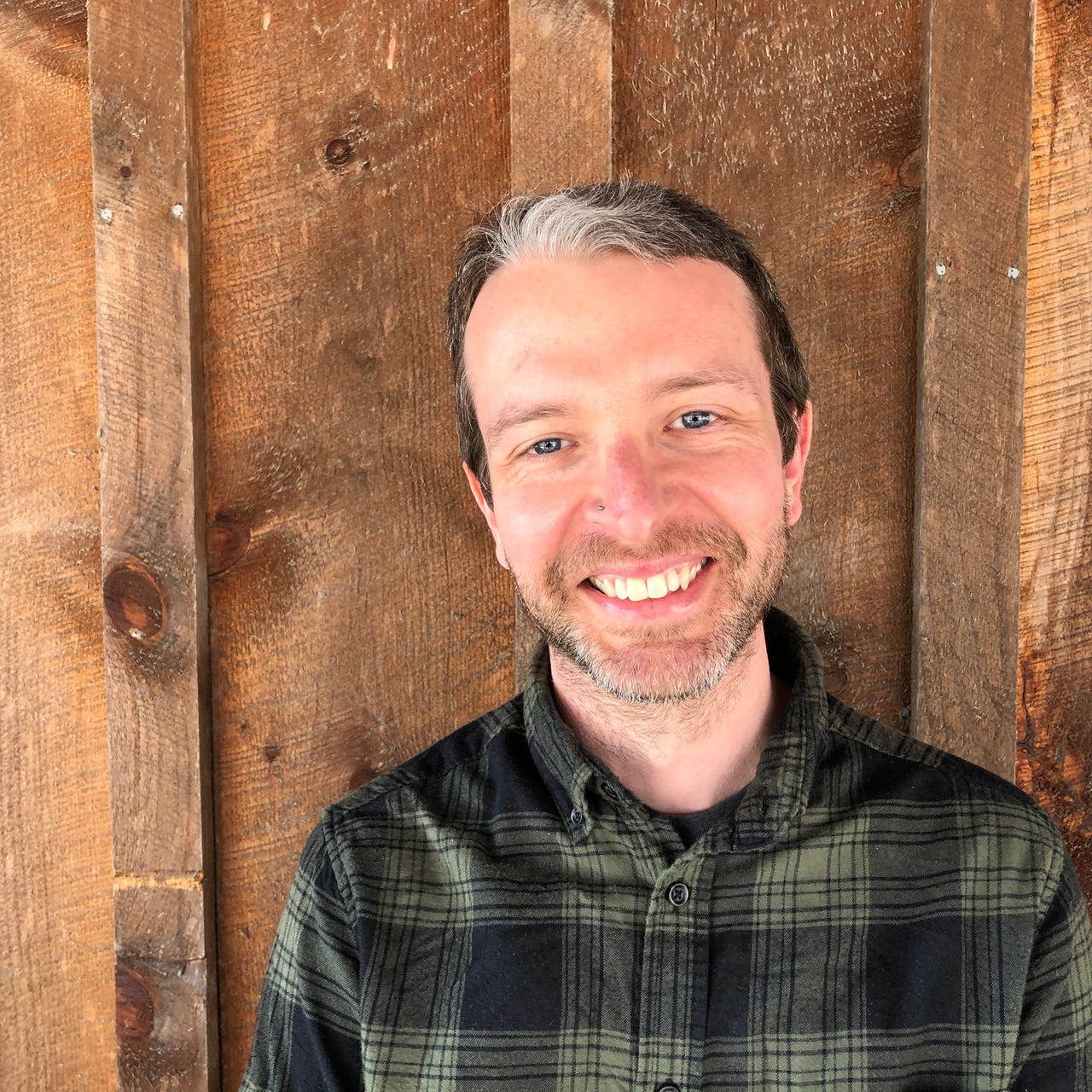
I really appreciate the idea of "allowing". Great piece!
So much here to enjoy and appreciate! Thank you!